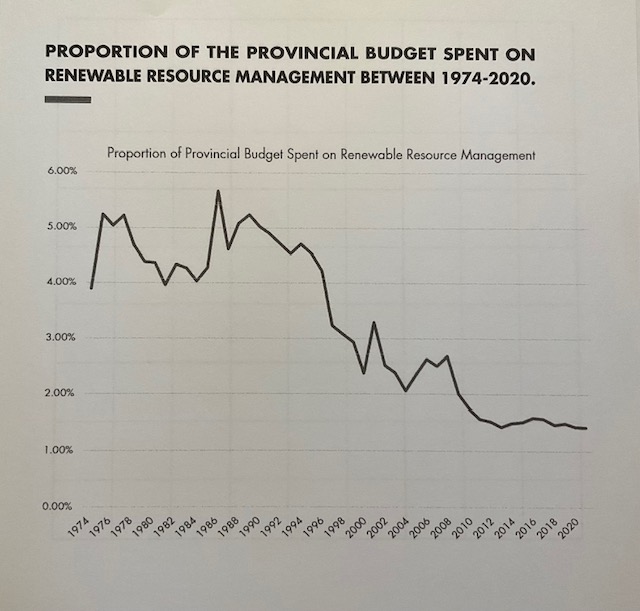#7 0f 7
OPINION: Remove politics from Wildlife Management, it’s time for an independent wildlife management agency
When governments use wildlife as a pawn in political games to court favor from their base, wildlife suffers, and British Columbians suffer, too.
Examples of our provincial and federal governments ignoring science, muzzling their own scientists, and bargaining away public access to public lands are depressingly numerous.
The Committee on the Status of Endangered Wildlife in Canada has repeatedly recommended an emergency listing order under the Species at Risk Act (SARA) for the Chilcotin and Thompson River steelhead, which have dwindled to just a few dozen fish. Politicians have consistently failed to heed the advice of their own experts and use SARA to its fullest extent to protect at-risk populations.
When British Columbia was handed a court decision compelling the government to address industrial encroachment on First Nations land, it responded, but not by following the direction of the court. Instead, they reduced the moose harvest by 50 per cent and closed the caribou hunt completely across the region, while 195 gas, oil, and forestry projects were allowed to continue.
B.C.’s approach to this settlement is deeply unnerving. The court’s ruling does not even mention hunting as a factor in the infringement of the Blueberry Nation’s Treaty 8 rights, but somehow curtailing hunting became the remedy.
When access to the outdoors and the natural assets of this province become bargaining chips to be dealt away for industrial development and political gain, we all lose. How long will it be before unabated access to large swaths of public land causing disruption to wildlife migration, rearing and other critical habitats are lost to all British Columbians?
B.C. researchers have found that people believe that fish and wildlife management is not well-funded, that government is shirking its duty, and that decisions about wildlife management should be made by professionals, based on science, rather than by elected officials. In B.C. the proportion of the Provincial Budget spent on renewable resource management has steadily decreased, in 2024, less than 1% of the Provincial Budget will be spent on renewable resource management. B.C. is failing on every count.
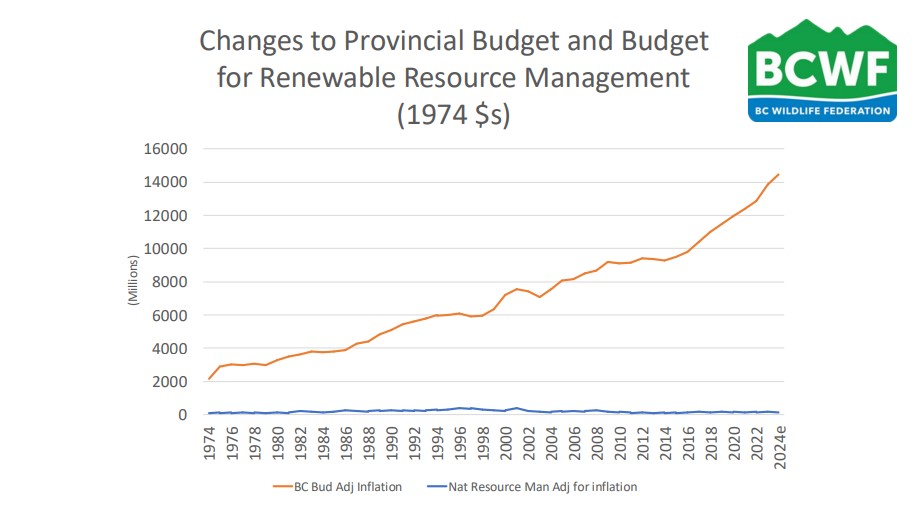
Management of fish and wildlife should be the responsibility of an agency independent of the government, one that is not influenced by commercial interests or popularity contests. Objectives need to be legislated and science-based to ensure that all wildlife populations are afforded legal protections that force the government of Canada to act.
When the provincial government tried to rush through changes to the Land Act, citizens pushed back hard, sensing that their opportunities to enjoy the land, water, and bounty of British Columbia was at risk. Their sham public consultation process was halted, at least temporarily.
Public consultation must be genuine, if British Columbians are to embrace substantial changes in the way that public resources are co-managed. All British Columbians deserve a say in their shared future. It’s time to move away from secret negotiations, hijacked process, and agreements which are neither shared with nor debated by British Columbians until it is too late. British Columbians are tired of engaging on regulations knowing that the decision has already been made behind closed doors.
An agency that is independent of the government influence is needed to ensure that decisions about natural resources, angling, hunting, and access to public lands are made based on science, not political expediency.
Ask questions of your candidates and demand answers. Is their party prepared to put in place an independent agency if elected?
#6 OPINION: Provincial Funding for Wildlife Management and Resource Stewardship must increase
The government’s capacity to manage wildlife has declined steadily for decades. Their ability to conduct meaningful science and inventories is scraping along at rock bottom. Wildlife populations are down, with iconic species teetering on the brink of extinction.
British Columbia has changed dramatically over the years. The number of people has increased, as has the need for housing and jobs, but the residential and industrial sprawl has encroached on the wilderness that drew many of us here in the first place.
Government revenue is going up, but we are not investing it in natural resource management. In fact, the proportion of government expenditures spent on fish and wildlife has dropped by 75 per cent between 1993 and today.
Funding for fish and wildlife management in British Columbia is estimated at about $7 per capita and in Alberta about $9 per capita. Contrast that with expenditures in nearby jurisdictions such as Washington ($29), Montana ($91), and Alaska ($235).
In 2024, BC will spend less than 1% of the annual provincial budget on wildlife management! Despite having one of the most bio-diverse regions in North America, we spend less per person, less per animal, and less per square kilometer than our neighbors and it shows!
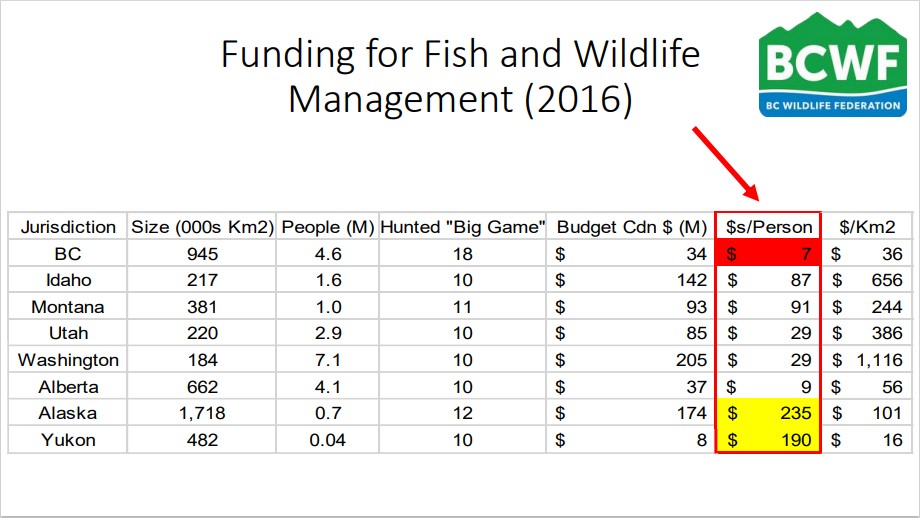
Wildlife is supposed to be managed as a public, shared resource for the benefit of all Canadians. One of the ways that this resource is shared by many British Columbians is as a food source. Many of us choose to feed our families with fresh, organic wild meat rather than processed, factory-farmed proteins. Hunters, more than anyone, want wildlife populations to be healthy and plentiful so that we can harvest a small percentage.
Hunters are willing to pay for this privilege; we pay a surcharge on licenses and tags, amounting to about 20 per cent of fees paid, which funds wildlife and habitat enhancement via the Habitat Conservation Trust Foundation. When asked, hunters have told B.C. researchers they would pay even more if those fees were dedicated to supporting wildlife. That same research found that hunters overwhelmingly support handing wildlife management over to an agency independent of government.
Hunters are adamant that their highest priorities for wildlife management are that it be sustainable for future generations and that decisions should be driven by science. Unfortunately, the decline of funding for wildlife management has severely curtailed data collection, which means we don’t have a good understanding about the health of many species and wildlife populations. You cannot manage what you cannot count.
Research respondents strongly believe that elected officials cannot be trusted to follow science, act for future generations, or to spend money wisely. We have seen our government curtail hunting in backroom deals to expand industrial activities that do real harm to wildlife. This must end.
Dedicated, annual funding of a minimum $200 million for renewable resource management is required. These funds should be derived from hunting license fees and charges, wildlife act fines, and from any activity that impacts wildlife and its habitat such as forestry, oil and gas extraction, mining, wildlife viewing, ecotourism, and backcountry recreational activities and other revenue sources deemed necessary to reach this target.
We must dedicate a sensible portion of the provincial budget to natural resource management and rededicate ourselves to data collection and quality scientific analysis for the health of B.C.’s iconic species.
It’s time to review how we spend our dollars. It’s time for government to act responsibly as to relates to funding renewable resource management.
It’s time to Put Wildlife First.
Ask your candidates if their party will increase dollars for renewable resource management and how much?
#5
Opinion: Wild Spaces are vital to our collective health
“Cultures around the world have long recognized natural settings as a balm for the soul” (Douglas Chadwick 2021). I would argue that we are far better served by connecting with nature, spending time outdoors, hiking, camping, foraging, fishing, and hunting.
The pocket park at the end of the block is a nice amenity and a wonderful place to play with your kid, but reaping the real benefits of nature requires a more immersive experience. This provincial election is an opportunity to adjust course.
I’ve experienced firsthand how much outdoor living is key to improving my physical and mental health. I’m not certain we need a lot of scientific studies to understand the value of spending time in wild places, but scientists have done a pile of them anyway. Research has shown that being in wild places quiets the mind, that sunsets and greenery relax our bodies, that the sound of leaves in the wind or the trickle of a stream releases your mind from worry, and that natural settings increase feelings of harmony.
Being in the backcountry can prevent or reduce obesity, as you move through the landscape harvesting natural foods. If eating the output of a global industrial food system worries you, it might be time to reconnect with nature.
Curated parks are great, and we encourage expanding urban greenspace, but they are not a substitute for wilderness.
To protect our access to the land and our ability to hunt and fish, the East Kootenay Wildlife Association is pushing to bring transparency and inclusiveness to co-management negotiations taking place in the Kootenays. All B.C.’s stakeholders need to be at the table if we are to share an abundant and sustainable future.
In my role with the East Kootenay Wildlife Association, I urge the provincial government to legislate an independent agency to manage wildlife sustainably, based on data and science, free from the whims of politicians.
I believe we are standing at the edge of a very steep precipice, and that it is up to each of us to engage with our elected officials and candidates for office and ensure that they hear our concerns.
I urge you to raise your voice, stand up for science-based wildlife and demand that our elected officials Put Wildlife First.
Ask questions of your candidates and demand answers.
#4 OPINION: It’s time to guarantee public access to public resources
British Columbia’s natural assets are the envy of the world, but our ability to access wild places and enjoy the outdoors is being overrun and accessed by many modes of motorized and non-motorized modes of transportation, into areas only once attainable by foot.
The North American Model of Wildlife Conservation protects wildlife as a shared public resource, allocated fairly to common folk. It is meant to be democratic and forward-looking. Over the past 30 years, British Columbia has drifted away from this egalitarian, sustainable model, particularly as the government embraces short-term political expediency.
Earlier this year, people were rightly outraged when the provincial government tried to rush changes to the Land Act and the backlash convinced our elected officials to rethink their strategy and restart their public consultation process. This lack of consultation is causing confrontations, habitat destruction and disruption to wildlife rearing and feeding areas.
As you can see in the picture below, all of us have an effect on wildlife and the reason why some regulation of our activities are needed, especially during critical times such as rearing of young, use of critical habitat for survival and moving through essential corridors. To have proper and thoughtful restricted activities requires engagement with the public to make them aware of where and when wildlife and habitat needs to be left alone or less frequented to arrive at meaningful stewardship planning.
By doing this we will ensure that all British Columbians can enjoy the beauty and the bounty of this province in perpetuity.
Ask questions of your candidates and demand answers.
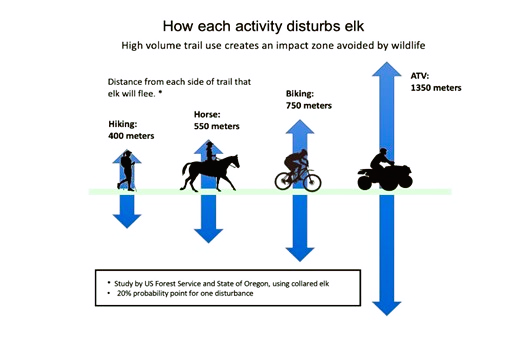
#3 OPINION: Responsible Wildlife Management MUST be backed by Responsible Science derived Data.
Centuries ago, Leonardo da Vinci advised “Learn to see. Realize that everything connects to everything else”.
We must get back to science-based wildlife management and halt BC’s slow-motion natural catastrophe here in the Kootenays as well as the rest of BC, something the East Kootenay Wildlife Association has been striving for a number of years.
Many of our iconic wildlife species are in decline, best exemplified by the progressive extinction of the mountain caribou herds of the southern Kootenays. Record low populations of mule deer, elk, and bighorn sheep in the Kootenays are lined up like dominos waiting to fall into the same abyss.
We are witnessing a slow-motion natural catastrophe, made worse by the provincial government’s steadfast refusal to make wildlife management decisions that are backed by science. Elected officials drag their feet to implement Stewardship Plans and opt for Limited Entry Hunting of many species with no science-based data to support this decision and no evidence that this action will address the declines.
The provincial government is failing to properly manage wildlife through science. Many wildlife populations in B.C., once healthy and growing, are now unhealthy. Politicians are making cougar decisions without cougar data, moose decisions without moose data, and sheep decisions without sheep data.
In the absence of data, in the absence of evidence, decisions about wildlife allocations and quotas are being driven by politics. The collapse of the Thompson River Steelhead population, Caribou extinction in the southern Selkirk Mountains are sad examples of proper management! With the coming of Chronic Wasting Disease to our ungulates and Whirling Disease in our fishery what political wisdom do we here in the Kootenays now face?
In 2020, the provincial government’s Together for Wildlife strategy promised to implement evidence-based decisions, supported by research and monitoring. That science-based approach has been guided by wildlife inventory in accordance with the Provincial Framework for Moose Management in B.C. But after creating this framework, the government has apparently abandoned it. This is unreasonable and ill-advised.
Management decisions are being used as sweeteners in reconciliation negotiations and garner votes within the urban population. Proposals to change the Hunting and Trapping Regulation will further erode hunter access and days on the land without scientific rationale. Unabated access to the alpine and fragile ecosystems continues with little to no enforcement in current restricted areas and the continued eroding of the experience nature brings in these areas.
The government admits there is no scientific basis for many of the new restrictions, nor any science-based plan. The sooner all British Columbians return to the table for good-faith negotiations, buttressed by thorough wildlife counts, the faster we can move toward a future of shared abundance.
Ask questions of your candidates and demand answers.
#2 Opinion: It is up to us to conserve our wild spaces
British Columbia’s neglect of wild things and wild spaces is a slow motion trainwreck.
With a provincial election coming this fall, the stakes could not be higher for B.C. wildlife and habitat, not to mention fresh and saltwater anglers, hikers, campers, hunters and outdoor enthusiasts. Iconic species are in obvious decline and candidates for office ignore us at their peril.
We need to convince our elected officials to Put Wildlife First and we have the numbers to make it happen. B.C. is home to 300,000 freshwater anglers, 275,000 saltwater anglers, 316,000 firearms license holders, and 110,000 licensed hunters. The EKWA represents 3700 members with 9 organizations. The numbers are in our favour.
The East Kootenay Wildlife Association (EKWA) is working to ensure that candidates and parties Put Wildlife First in their platforms. EKWA is engaging with candidates and parties, holding town halls, and encouraging the public to vote alongside our members with wildlife in mind. Make sure you know which candidates and parties are committed to independent, science-based resource management, with transparent, legislated objectives for improvement.
British Columbia has been defunding the environment and wildlife management for nearly 50 years. Dollars dedicated to wild things and wild spaces have declined from more than five per cent of total provincial expenditures to about one per cent. Less than one percent of your tax dollars are going to take care of what we all cherish.
Stated another way, the provincial government’s allocation for natural resource management as a proportion of the total budget is down more than 75 per cent. Budget dedicated directly to fish and wildlife management is even less.
B.C. has long profited from natural resource extraction. We must use some of that money to ensure that service roads are removed, extraction sites are rehabilitated, forests are maintained, and habitat is restored. B.C. is failing on every count.
We can influence this election candidate by candidate, vote by vote. If you want to see a change in how our wildlife is managed, you must attend campaign events and talk to your local candidates. It is vital that they hear our concerns everywhere they go.
Ask questions of your candidates and demand answers.
Unless the province sets aside a meaningful portion of our provincial budget for our renewable resources, we will continue to see fish and wildlife decline, experience massive uncontrollable wildfires, and suffer the consequences of widespread flood and drought.
You are not powerless in this struggle. Elections in B.C. are won and lost by a few thousand votes across swing ridings. The outdoors community, EKWA members, hunters, and anglers number in the hundreds of thousands. We can decide the next election.
Use your voice. Loudly.
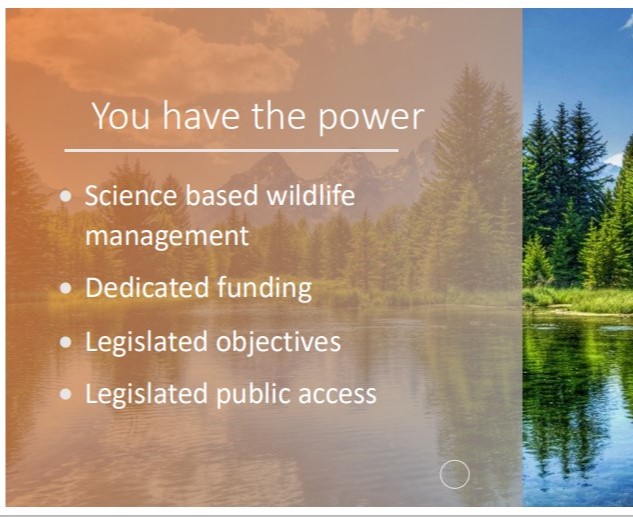
#1 Opinion: Healthy, organic food for my table
Are we doomed to become like indoor cats, hunkered down with limited space to roam, and eating food from a box? The North American Model of Wildlife Conservation protects wildlife as a shared public resource, allocated fairly to common folk, and managed based on sound science. It is meant to be democratic and forward-looking.
Over the past 30 years, British Columbia has drifted from this egalitarian, sustainable model, particularly as the government embraces short-term political expediency over science-based decision-making. For decades, the narrative around public consultation has always been the same. Write to your MLA. Talk to your MLA. They represent you.
Members of the outdoor community are trying to get the government’s attention. The BC Wildlife Federation along with the East Kootenay Wildlife Association organized a series of open houses across B.C. to engage with elected officials and candidates for office and demand an end to backroom dealing.
We are witnessing a slow-motion natural catastrophe in the absence of data, in the absence of evidence, decisions about wildlife allocations and quotas are being driven by politics. The result is a creeping conversion of General Open Season hunts into Limited Entry Hunts and the erosion of allocations for some species by 50, 80, or even 100 per cent, with no discernable scientific reasoning.
B.C. is home to 300,000 freshwater anglers, 275,000 saltwater anglers, 316,000 firearms license holders, and 110,000 licensed hunters. The numbers are in our favour. We need to convince our elected officials to Put Wildlife First and we have the numbers to make it happen. Candidates for office ignore us at their peril.
B.C. has long profited from natural resource extraction. We must use some of that money to ensure that service roads are removed, extraction sites are rehabilitated, forests are maintained, and habitat is restored. In B.C. the proportion of the Provincial Budget spent on renewable resource management has steadily decreased, in 2024, less than 1% of the Provincial Budget will be spent on renewable resource management. B.C. is failing on every count.
We can influence this election candidate by candidate, vote by vote. If you want to see a change in how our wildlife is managed, you must attend campaign events and talk to your local candidates. It is vital that they hear our concerns everywhere they go.
Ask questions of your candidates and demand answers.
